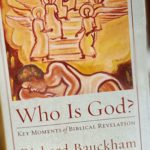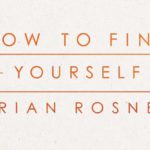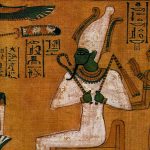Part of the series “My Year In…”
Here are my 10 favourite books from this year. Listed in alphabetical order, it’s an eclectic mix of theology, psychology, science, apologetics, and ancient Church Fathers.
1. The Gospels as Stories (Jeannine K. Brown)
For a book about narrative criticism (a technical term that broadly means reading the stories in the Bible as stories) this book is pitched at a level that’s approachable and understandable for almost any of us. Brown helps us dive into plotting in Luke, characterization in Matthew, intertextuality in John, and narrative theology in Mark. If you love stories and you love the Gospels, then you may love this book.
2. On the Cosmic Mystery of Jesus Christ (Maximus the Confessor)
Despite my finitude, I’m fairly sure Maximus the Confessor is one of the most brilliant people to have ever lived. I encountered his work when I first began researching Made Man and endeavoured since then to read as much of his work as I could. On the Cosmic Mystery of Jesus Christ is a collection of various writings and some are better than others. It can be pretty hard going, with a nuanced discussion about Christ’s natural, gnomic, and prohairetic wills (or lack thereof). It’s certainly not a book for everyone, but it’s a good option if you’re looking to read some ancient theology written by a genius.
3. Made in Our Image (Stephen Driscoll)
This book is easily my favourite from this year. Driscoll’s writing is sharp, electric, and entertaining. It felt less like a book on artificial intelligence (AI) and more like a book on key aspects of Christian thought viewed through the doorway of AI. You should read this book even if you don’t care about AI.
4. Hidden Potential (Adam Grant)
Finding and developing the greatness within people is a primary part of leadership development. Anything that helps me get better at doing that is valuable. Admittedly, this book isn’t as good as others Grant has written, but his bar is set pretty high. There are whole sections on the importance of character; research on how to overcome perfectionism and maximise the collective intelligence of teams; the pitfalls of interviews; and a whole host of other topics. You might not love everything, but you’ll almost certainly find something that’s valuable.
5. A New Way to Think (Roger L. Martin)
Martin is a business consultant and regular Harvard Business Review article writer. In this book he takes persistent and assumed “models” (by which he means accepted wisdom on how to do stuff) and rethinks them. Often we assume the model is correct, and so when it doesn’t work it’s because we didn’t do it right or implement it vigorously enough. For instance, the way everyone does goal setting isn’t working out for you, so you work harder at being more specific and measurable rather than considering whether writing down specific goals will actually help you achieve more.
Martin assumes the model is deficient and seeks to analyse where it might be broken. It’s not “right or wrong”, it’s more like “better or worse.” He tackles wide-ranging topics from culture to organisational design, strategy, planning, data, and execution. Not every “New Way to Think” is as good as the others, but it’s stimulating and helpful to a watch a re-thinking agenda play out in various arenas.
6. On the Thirty-Nine Articles (Oliver O’Donovan)
This isn’t a book unpacking and explaining the Anglican Thirty-nine articles. Instead, it’s akin to a conversation that takes place between O’Donovan and the Tudor Christianity encoded in the Articles. O’Donovan raises issues like the Articles’ strange creation-shaped hole or the lopsidedness of Article 19 with the disappearance of the invisible Church. Being able to peak behind the curtain and overhear O’Donovan’s theological conversation with Tudor theology is where this book shines.
7. The Air We Breathe (Glen Scrivener)
I’ve read a few books now that speak into our cultural moment and seek to show its historical roots in Christianity. Scrivener’s book is my favourite from this bunch. Well written and smoothly articulated, Scrivener has a humble and playful yet confident and persuasive style that makes The Air We Breathe well-suited for a wide range of readers whether within the family of faith or not.
8. Systematic Theology vol. 1: The Doctrine of God (Katherine Sonderegger)
The first volume of Sonderegger’s Systematic Theology was a surprisingly readable experience. It’s not dry, but instead feels like Sonderegger is actually doing theology rather than simply restating an historical position. Did I agree with everything she said? Absolutely not. Did I even understand everything she said? I don’t think so. Nevertheless, I was helped to see and think about the doctrine of God from a different angle in a way that revealed topics and aspects I hadn’t thought much about.
9. Why We Sleep (Matthew Walker)
Most of us are familiar with words like caffeine, REM sleep, cancer, and Alzheimer’s. Less of us will be familiar with words like melatonin and circadian rhythms. Almost none of us will be familiar with the glymphatic system or amyloid proteins, let alone how all these words relate to each other. But they do! The most lethal and scary causes of death in our society are things like heart disease, obesity, dementia, diabetes, and cancer. And all of them have direct, recognised, casual links to a lack of sleep.
Walker’s book is almost too full of arresting information. It’s a bit of an overload and at multiple points is just hard work to read. But it’s worth the effort. The bottom line: our lack of sleep is literal brain damage and it’s killing us. I think I might go to bed early tonight.
10. The Gender Revolution (Patricia Weerakoon)
It feels like all things gender are the topic of the times in which we live, and it’s easy to get confused between science and opinion. More than that, it’s easy to lose sight of loving those for whom these aren’t just ideas and ideology but their actual, often-painful, human experience. The Gender Revolution combines truth with love to shine the light of the Bible into this confusion. What results is a book full of scientific learning, actual experience, clear biblical faithfulness, and careful pastoral sensitivity.















